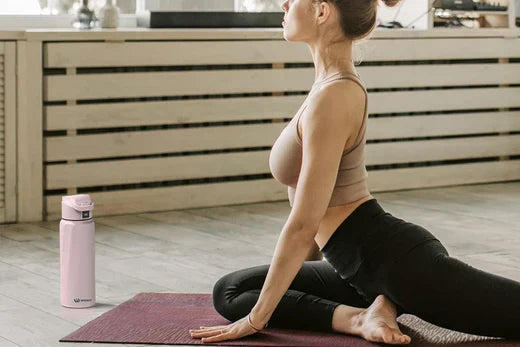
Hydrate to Fight Fatigue: How Fluids Boost Energy and Combat Tiredness?
Are you feeling tired even after a full night’s sleep? If you're reaching for caffeine or sugary snacks to combat that midday slump, you might overlook the simplest solution: water. Dehydration can be a hidden culprit behind your fatigue, and staying properly hydrated is one of the easiest and most effective ways to keep your energy levels up and fight tiredness. In this blog, we’ll explore how hydration plays a key role in fighting fatigue and boosting energy, along with practical tips to stay hydrated throughout your day.
How does hydration fight fatigue?

Improved blood circulation
When properly hydrated, blood volume is maintained at optimal levels, allowing for better circulation. This means oxygen and nutrients are delivered more efficiently to muscles, tissues, and organs. Blood circulation can slow down without adequate hydration, leading to fatigue and reduced energy levels.
Energy production and hydration
At the cellular level, water plays a crucial role in energy production. It helps create ATP (adenosine triphosphate), the molecule that powers your cells. Dehydration impairs ATP production, leaving you with less energy to get through the day.
Regulating body temperature
Dehydration can also interfere with your body’s ability to regulate temperature. When dehydrated, your body struggles to cool itself down, leading to overheating and fatigue. Staying hydrated helps maintain your body’s thermal balance, preventing excessive heat buildup that leads to exhaustion.
Hydration and sleep quality
Believe it or not, dehydration can also disrupt your sleep. When you don’t drink enough fluids, your body has to work harder to restore itself during the night, which can impact the quality of your rest. Staying hydrated promotes deeper, more restful sleep, which in turn helps you wake up feeling refreshed and energized.
The importance of electrolytes in hydration

What are electrolytes?
Electrolytes are minerals like sodium, potassium, and magnesium that help regulate the balance of fluids in your body. They also play a critical role in nerve function and muscle contractions. Without a proper balance of electrolytes, dehydration can quickly lead to fatigue, muscle cramps, and even confusion.
How do electrolytes help combat fatigue?
Electrolytes help maintain the body's fluid balance, preventing dehydration and fatigue. When you sweat, you lose both water and electrolytes, so it’s important to replenish both, especially after intense physical activity.
Foods and drinks rich in electrolytes
Bananas, coconut water, spinach, yogurt, and sports drinks are some foods and drinks rich in electrolytes. Incorporating these into your diet can help maintain energy levels and combat fatigue, especially during intense activity or heat.
How much water should you drink to stay energized?
Recommended daily water intake
The general recommendation for daily water intake is about 8 cups (64 ounces), but individual needs may vary depending on factors like age, gender, activity level, and climate. The more active you are or the hotter the environment, the more fluids you’ll need.
Signs you might be dehydrated
Dehydration doesn’t always manifest as extreme thirst. Symptoms to watch out for include dry mouth, dizziness, headaches, fatigue, and dark-colored urine. If you notice any of these signs, it’s time to drink up.
Tips for staying hydrated throughout the day
- Carry a Waterh Boost and take small sips throughout the day.
- Set hydration reminders on your phone to help you stay on track.
- Include water-rich foods like cucumbers, watermelon, and oranges in your meals.
Hydration tips to maximize your body energy
Drink water before you feel thirsty
Thirst is often a late sign of dehydration. To stay ahead of fatigue, try drinking water consistently throughout the day, even if you don’t feel thirsty.
Choose hydrating beverages wisely
While sugary drinks may give you a temporary energy boost, they often lead to a crash later on. Stick to water, herbal teas, or low-calorie electrolyte drinks for sustained hydration and energy.
Integrate hydrating foods into your meals
In addition to drinking water, include hydrating foods in your diet. Fruits and vegetables like watermelon, cucumbers, and celery have a high water content, helping you stay hydrated and providing essential nutrients.
Morning hydration ritual
Start your day with a glass of water to rehydrate after sleep. This simple habit can help you feel more energized and focused.
Special considerations for highly active people
Hydration for athletes and active lifestyles
If you exercise regularly, staying hydrated is even more important. Dehydration can impair your performance, increase your risk of injury, and leave you feeling drained. Ensure to drink water before, during, and after exercise to maintain energy levels and replenish fluids lost through sweat.
Sports drinks vs. water
Sports drinks containing electrolytes may be a better option for longer-duration exercise or intense activities than water alone. These drinks help replace fluids and electrolytes lost during sweating, keeping you energized throughout your workout.
Conclusion
Proper hydration is one of the simplest and most effective ways to fight fatigue and boost energy. By staying hydrated, you ensure that your body functions at its best, from maintaining optimal brain function to improving circulation and muscle recovery. Make hydration a priority in your daily routine—your energy, mood, and overall health will thank you.
So, next time you feel that afternoon slump, consider reaching for a glass of water instead of a sugary snack. Your body and mind will be much happier for it! Following WaterH to find more tips for staying well hydrated.















